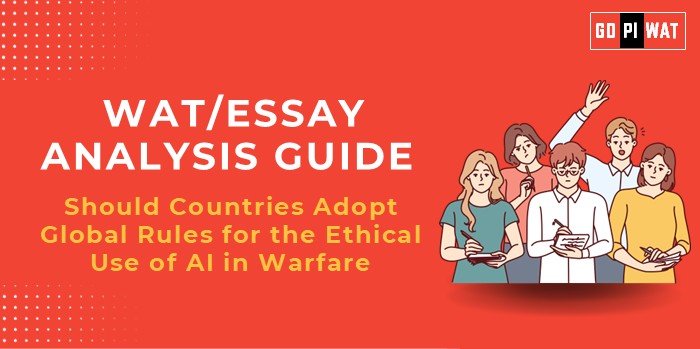📋 WAT/Essay Analysis Guide
🌍 Topic: Should Countries Adopt Global Rules for the Ethical Use of AI in Warfare?
📖 Understanding the Topic’s Importance
💡 AI’s integration into warfare necessitates a global consensus on ethical norms to prevent misuse and foster accountability, impacting international security and policy.
🕒 Effective Planning and Writing
- ⏱️ Time Allocation:
- Planning: 5 minutes
- Writing: 20 minutes
- Review: 5 minutes
- 📚 Preparation Tips:
- Research ethical principles, existing international laws, and key stakeholder roles in AI governance.
- Understand AI’s potential in precision operations and the risks posed by autonomous systems.
✍️ Introduction Techniques for Essays
- ⚖️ Contrast Approach:
“AI, a tool for saving lives in medicine, also powers autonomous weapons capable of lethal force, raising pressing ethical questions.”
- 💡 Solution-Based:
“Global rules on AI in warfare can reconcile innovation with accountability, ensuring its safe deployment.”
- 📜 Timeline Introduction:
“Since 2018, calls for global AI ethics in warfare have intensified, culminating in 2023 with the UN’s draft guidelines.”
📚 Structuring the Essay Body
- 🏆 Achievements:
- AI enhances precision in military operations, reducing collateral damage.
- Successful deployment of AI in cyber defense to preempt threats.
- ⚠️ Challenges:
- Ethical dilemmas surrounding autonomous decision-making in life-and-death scenarios.
- Regulatory gaps leading to unmonitored AI deployment in conflict zones.
- Risks of malfunctions or misuse, such as algorithmic errors or hacking.
- 🌏 Future Outlook:
- Propose a phased approach to international agreements, starting with transparency requirements.
- Develop collaborative research hubs to establish ethical frameworks and mitigate risks.
- Emphasize partnerships between governments and private sectors to ensure ethical innovation.
🔑 Concluding Effectively
- ⚖️ Balanced Perspective:
“Adopting global ethical norms is a collective step toward securing AI’s potential in warfare while mitigating risks.”
- 🌍 Global Comparison:
“Similar to nuclear treaties, AI ethics frameworks can ensure stability and trust among nations.”
📊 Analyzing Successes and Shortcomings
- 🏆 Key Achievements: Improved strategic capabilities through AI and the initiation of international dialogue on AI ethics.
- ⚠️ Ongoing Challenges: Algorithmic bias, cybersecurity vulnerabilities, and geopolitical competition.
- 🌏 Global Context: Draw parallels with nuclear disarmament frameworks and lessons learned from their successes and failures.
🌱 Recommendations for Sustainable Progress
- 📜 Develop collaborative research hubs to create shared ethical principles and enhance AI accountability in warfare.
- 📈 Enforce periodic reviews of AI systems to monitor compliance with ethical guidelines.
- 🤝 Foster public-private partnerships to ensure responsible AI development and deployment.
📄 Sample Short Essays
- ⚖️ Balanced Perspective:
“Global AI ethics in warfare can harmonize innovation and accountability, ensuring peace.”
- 💡 Solution-Oriented:
“Transparent global rules are key to mitigating AI’s risks in military use.”
- 🌍 Global Comparison:
“Lessons from nuclear treaties highlight the importance of cooperation in AI ethics.”


